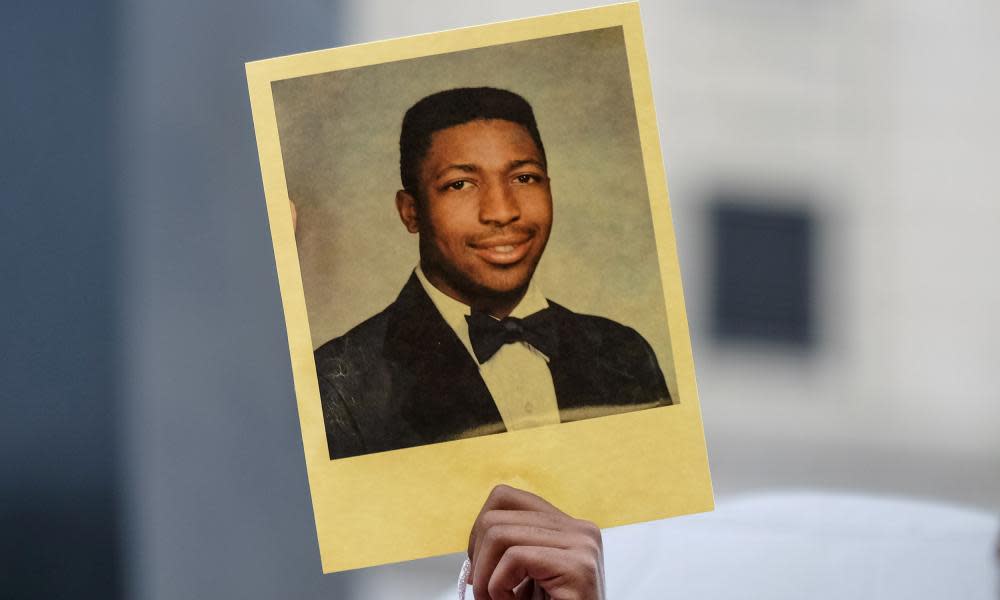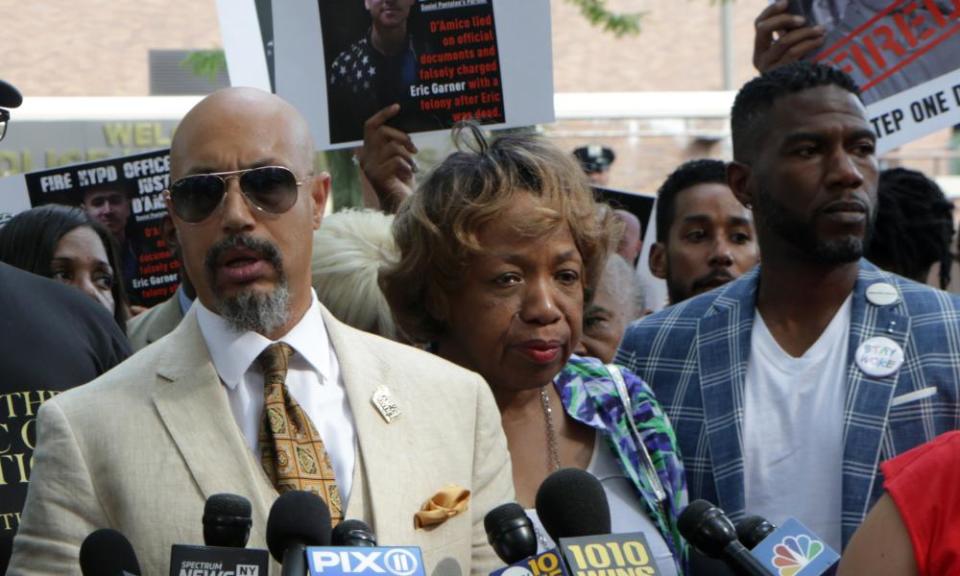Firing of officer who put Eric Garner in chokehold is just first step to justice

One thousand, eight hundred and sixty days after Eric Garner was killed on the streets of Staten Island, New York, his family finally received a sliver of justice.
On Monday, the New York police department (NYPD) commissioner, James O’Neill, announced the NYPD would fire Daniel Pantaleo, who, on that hot summer’s day in July 2014, placed the unarmed 43-year-old in a banned chokehold that contributed to Garner’s death.
The decision follows years of protest, stalled investigations and secrecy in a case that came to embody the fractured relations between communities of color and police not just in New York City but around the US.
And Pantaleo’s firing, the Garner family insists, should only be the beginning of the process.
At a rally outside NYPD headquarters in lower Manhattan on Monday, Garner’s mother, Gwen Carr, struck a defiant tone. “We’re not finished. We have other officers that we have to go after. You have heard the names. We know the wrongdoing that they have done,” she said. “Show the pictures, say the names. Do the roll call, because they all need to lose their jobs.”

The family has long demanded that in addition to Pantaleo, several other officers involved in Garner’s arrest should be punished for their roles in the incident.
“We’re not finished. We have other officers that we have to go after,” Garner’s mother, Gwen Carr, said outside a rally outside NYPD headquarters in lower Manhattan on Monday. “You have heard the names. We know the wrongdoing that they have done. Show the pictures, say the names. Do the roll call, because they all need to lose their jobs.”
But even after the announcement of Pantaleo’s dismissal on Monday, the fates of the other officers remain largely opaque, as NYPD internal disciplinary procedures remain shrouded in secrecy. And there is little to suggest that any will face a similar process.
Pantaleo was fired following an administrative trial brought by the CCRB, the city’s independent police review board, in a process overseen by an NYPD trial judge.
The judge, Rosemarie Maldonado, said in a secret judgment to O’Neill thatthe chokehold “fell so far short of objective reasonableness that this tribunal found it to be reckless – a gross deviation from the standard of conduct established for a New York City police officer”. She recommended Pantaleo to be fired. (The judgement was leaked to the New York Times.)
Although Pantaleo did not testify during the trial, he was interviewed by NYPD internal affairs in the aftermath of the incident and argued, even after watching the eyewitness video of Garner’s death, that he had not used a chokehold maneuver at all. Maldonado made clear in her judgement that Pantaleo’s answer was “untruthful” and “self-serving”.
But other officers involved did testify as defendant witnesses, and Maldonado found elements of some their testimony problematic. It is these six men, and one female sergeant, the Garner family wants dismissed. The two senior officers, Lt Christopher Bannon and Sgt Dhanan Saminath, were not present during the physical altercation that led to Garner’s death. But the patrol officers Mark Ramos, Craig Furlani, Justin Damico and William Meems were all involved in the apprehension.
Each of the four officers testified they had not seen the positioning of Pantaleo’s arms during the arrest. Maldonado’s judgement describes this testimony as “unhelpful or unreliable”, noting: “The more central the factual inquiry [from prosecutors] was, the more vague recollections became.” But the document does not make a determination on whether any of the four should face discipline.
These are not the only issues the Garner family has over the conduct of this group of six officers during the incident.
Bannon, the commanding officer who initiated Garner’s arrest after observing a group of people he believed to be involved in the sale of untaxed cigarettes on his way to a meeting that morning, told Saminath via text that Garner’s death was “not a big deal” after being informed of it.
After Garner’s death, Damico, Pantaleo’s partner that day,processed Garner’s arrest on an inflated felony, suggesting Garner had been found with 10,000 untaxed cigarettes even though officers recovered just two packets on his body.
It is not clear if either of these incidents could or would be investigated as misconduct.
When asked about this finding at a press conference on Monday, O’Neill, the commissioner, intimated that none of the four officers would be subject to internal charges as a result, pointing out that the NYPD’s internal affairs office had already examined them.
“This whole situation transpired in seconds,” O’Neill said. “And if they could recount step-for-step what they did, I think that would be nothing short of a miracle.”
The NYPD did not answer a request for further clarification, and referred the Guardan to O’Neill’s comments.
The CCRB, which has the power to bring a case if a complaint is filed by a member of the public, did not respond to a request for comment.
“There’s a lot that clearly that went wrong in the situation that led to Eric Garner’s killing. And it wasn’t just Officer Pantaleo. There is potential misconduct from any number of officers which should be investigated and, if warranted, pursued through disciplinary proceedings,” said Michael Sisitzky, lead policy counsel at the New York Civil Liberties Union.
The NYPD has, however, leveled disciplinary charges against Kizzy Adonis, who was the supervisory sergeant present in the immediate aftermath of Garner’s arrest.
Adonis faces four counts of “failure to supervise”, according to press reports. The media reports say the sergeant told internal investigators she observed that Garner, who had said “I can’t breathe” 11 times during the apprehension, did not seem in a serious condition and that “he did not appear to get worse”. While the NYPD has confirmed that Adonis will face trial, it has not commented on the charges themselves meaning the process itself and the potential punishment remain unclear. .
On Monday, O’Neill said Adonis’s trial would be held before the end of the year but did not provide a specific date. It will be prosecuted by NYPD internal affairs.
Adonis’s attorney Andrew Quinn, and the Sergeants Benevolent Association, the union representing her, did not respond to requests for comment.
The NYPD did not provide further clarification on Adonis’s trial beyond O’Neill’s comments.

 Yahoo News
Yahoo News 
